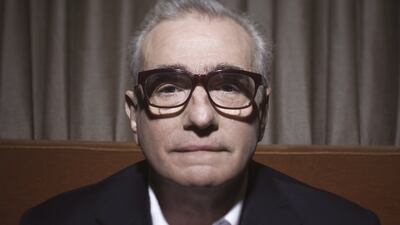Killers Of The Flower Moon marks Martin Scorsese’s 26th feature film. Like many of the filmmaker’s previous efforts, the epic crime drama has already been met with stellar reviews.
Starring Leonardo DiCaprio, Robert DeNiro and Lily Gladstone, Scorsese’s adaptation of David Grann’s 2017 novel is set in the 1920s and revolves around members of the Osage Native American tribe in Oklahoma being murdered after oil is found on their land.
Where exactly Killers Of The Flower Moon ranks against Scorsese’s other movies remains to be seen. Goodfellas, Raging Bull and Taxi Driver in particular are roundly celebrated as three of the greatest movies ever created, as they combine visual flair with memorable characters and startling imagery and violence.
Meanwhile, Mean Streets will always be remembered as his first critical and commercial success. The Departed is the movie that finally landed him an Academy Award, while The Wolf Of Wall Street is the highest-grossing film that he’s ever made.
Scorsese, 80, has made so many movies, though, that some of his masterpieces have actually managed to slip through the cracks and go under the radar for various reasons. To mark the release of Killers Of The Flower Moon, here are five of Scorsese’s most underrated movies that really deserve your attention.
After Hours

After Hours was a pivotal movie for Scorsese. While Raging Bull just about made its money back, his follow-up to the boxing drama The King Of Comedy was a huge flop. Over the last 40 years, The King Of Comedy has rightfully found its audience and is now deemed one of Scorsese’s best films. But it was the small budgeted comedy After Hours that ensured Scorsese still had a career.
After meeting the beautiful and mysterious Marcy (Rosanna Arquette) in a Manhattan cafe, Paul (Griffin Dunne) travels to her downtown apartment to see her again. His night soon goes wildly out of control. Paul meets a variety of surreal and dangerous characters and finds himself stuck downtown with no way to get home.
Arguably the closest Scorsese has ever come to making a straight comedy, After Hours has his usual edge and energy and its 97-minute-long run time goes by in a flash.
Silence

Scorsese spent 20 years trying to adapt Shusaku Endo’s 1966 novel. When he finally did in 2016, audiences struggled to connect with the historical epic, and it made nowhere near its $40 million budget. That doesn’t mean that the film was a critical or artistic failure, though. Far from it, as Scorsese was able to use his lifelong interest in religion to create a subtly mesmerising and ultimately deeply profound look at faith and spirituality.
Set in the 17th century, Silence tells the story of two Portuguese missionaries (Andrew Garfield and Adam Driver) who embark on a journey to Japan to find their missing mentor (Liam Neeson). Once they arrive, they have to hide from the country’s lords and samurai, otherwise they’ll be tortured and killed. The result is a thought-provoking and meticulously made drama that deserves to be re-examined and adored.
Alice Doesn't Live Here Anymore

After Mean Streets established Scorsese as one of the most exciting new filmmakers in America, Hollywood finally started to offer him a variety of projects to direct. In a somewhat surprising move, Scorsese decided to go in the opposite direction with his follow-up to Mean Streets.
Alice Doesn’t Live Here Anymore is a romantic comedy drama about Alice Hyatt (Ellen Burstyn) who, after the sudden death of her husband, sells all of her belongings and takes her young son Tommy from New Mexico back to her childhood home of Monterey, California. She wants to rekindle her dream of becoming a singer, which she abandoned when she got married. But her lack of money soon results in her becoming a waitress in a diner instead.
Alice Doesn’t Live Here Anymore was a huge success, grossing more than 10 times its $1.8 million budget. Burstyn also won the Best Actress Academy Award, and it immediately secured Scorsese’s status among Hollywood studios.
The Age Of Innocence

The Age Of Innocence is about as unique a Scorsese movie as you can imagine. Based on Edith Wharton’s novel, which won the 1921 Pulitzer Prize For Fiction, it is a romantic period drama set in the upper-class Gilded Age of the 1870s.
Newland Archer (Daniel Day-Lewis) is a wealthy lawyer engaged to younger socialite May Welland (Winona Ryder). The sudden arrival of May’s beautiful cousin Countess Ellen Olenska (Michelle Pfeiffer) soon complicates their potential marriage, though, as she and Newland start to fall in love.
One of the most stylish and sleek movies that Scorsese ever made, he combines his usual cinematic finesse with an elegance, poise and eye for detail that feels reminiscent of a classic Hollywood film from the 1940s and 1950s.
American Boy: A Profile of Steven Prince

While Scorsese will undoubtedly be remembered for his feature films, his documentary work is just as stellar. He has made 16 documentaries, including the concert films The Last Waltz and Shine A Light, and extensive films on the lives and work of George Harrison and Bob Dylan.
His most captivating documentary was made in 1978. It’s relatively simple, too, as it involves Scorsese and a group of his friends listening to the stories of charismatic actor Steven Prince, who recalls being a drug addict, a road manager for Neil Diamond and various traumas he’s experienced. All of which Scorsese intercuts with footage of Prince as a child, which helps to make the film more intimate, deeply moving and underlines his unrivalled filmmaking ability.

